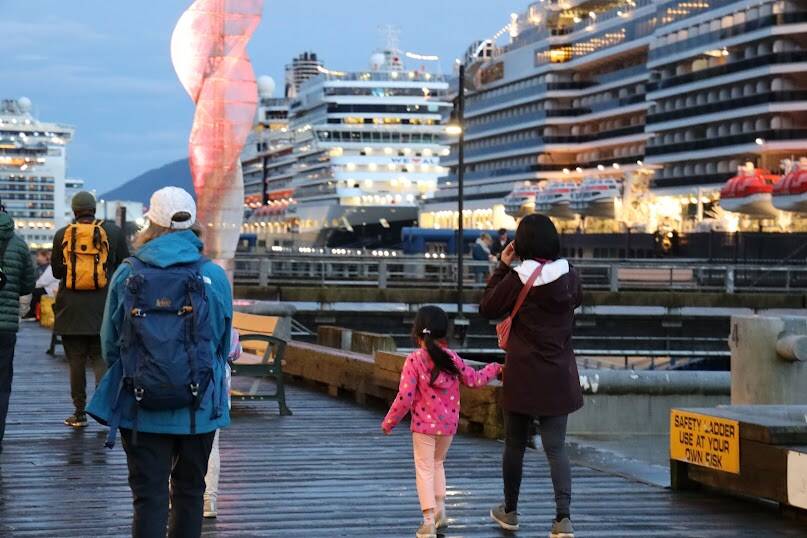With just around two months until the kickoff of the 2023 cruise ship tourism season, the City and Borough of Juneau is seeking guidance from residents on how they’d like to see the city spend its marine passenger fee funds. Those funds are generated by cruise ship passengers and are project to total around $21.5 million.
That amount is based on the city’s estimation that 1.4 million cruise ship visitors will come to Juneau this upcoming cruise season, but as many as 1.6 million people could come to town if the ships are at capacity, according to CBJ Tourism Manager Alexandra Pierce.
Each of those more than 1 million passengers must pay a $5 marine passenger fee along with a $3 port development fee and a $5 state’s commercial passenger vessel excise tax which is how the marine passenger fee funds are generated each year.
The city has limitations on how it can spend the passenger fees after a 2019 settlement made between CBJ and Cruise Lines International Association Alaska, which brought a lawsuit asking for the fees to only be spent on things related to cruise vessels themselves and argued the city was being too permissive with its spending of the funds.
“We’re encumbered on how we can spend these funds — it doesn’t function like a normal tax,” Pierce said. “We have a mapped-out area where it can be spent, and as much as we love to use this money for paving roads outside of the area, it is a little bit of a different funding source than general funds.”
The city has shared a list of 27 projects that are recommended to receive the funds. Some of the most notable projects include putting around $10 million of the funding toward an expansion of the Seawalk, $1 million toward the proposed Capital Civic Center and $2 million for Marine Park improvements.
[City OKs steps toward proposed Capital Civic Center]
Pierce said the $2 million toward Marine Park will be used to fund the construction of the project which is still in the design phase, and the $1 million that is recommended to go toward the proposed Capital Civic Center — which if approved is could cost up to $75 million — is to help secure potential federal funding.
“We’re trying to secure federal funding by having a bit of local skin in the game,” she said. “It’s also representative of the cruise ship industry’s support of the project.”
The most expensive recommendation, $10 million toward an expansion of the Seawalk between the Franklin Dock and AJ Dock, would only partially cover the cost of the proposed project according to City Manager Rorie Watt, who estimates the project’s total ballpark cost to be around $20 million.
“Seawalk projects are not cheap,” Watt said. “ But we’re trying to get that Seawalk project going, it’s probably the biggest thing on the list.”
Pierce agreed and said the project is likely going to be expensive but noted the cost of the estimated total could fluctuate depending on a variety of factors that are currently still being figured out by the city, such as whether it will be raised or leveled with the current dock.
In recent years, passenger-proposed projects that were approved funded projects downtown like the construction of water-filling stations and pedestrian stanchions, along with projects at Don D. Statter Harbor such as improvements to facilities for whale watching boats.
Residents have until March. 17 to make comments that can be sent via mail to the City Manager’s Office, or to Pierce at alexandra.pierce@juneau.gov. After the comment period, Pierce said the recommendations will be presented to the Assembly Finance Committee for review and consideration before being considered during the upcoming budget cycle.
• Contact reporter Clarise Larson at clarise.larson@juneauempire.com or (651)-528-1807. Follow her on Twitter at @clariselarson.

